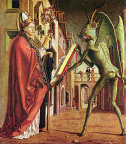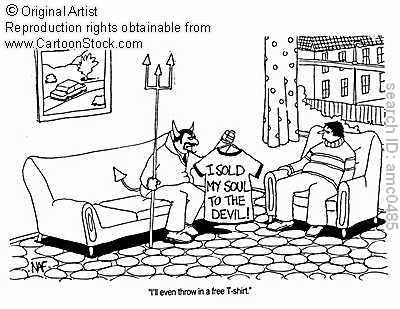
|
I checked out some previews of the new Rob Zombie film “The Lords of Salem.” I’m excited. I love movies about the devil, and the song the witches are singing in the clip reminds me of my own song “The Invocation.” I’m probably the most dogmatically atheistic person you’ll ever meet. I mean, I don’t just believe in the fact of a godless, naturalistic universe. I go further and insist that people must believe as I do in order to act ethically. Yet, the occult is the most fascinating subject. Maybe it’s because the occult is all about secrets and shortcuts. Suppose you’re ugly and can’t get laid, you’re tired of being broke all the time, or maybe life is just too damn short and you’re afraid of dying. Just summon a demon and get what you want. It’s easy and it will only cost you your soul, which is probably bullshit anyway. For thousands of years there have been rituals and incantations to summon forces to aid in material gain. Naturally there have also been prohibitions. If these incantations worked, well, it wouldn’t be good if everyone used them all the time. There’s only so much stuff to go around. If they didn’t work, then that means the associated mythology is bunk also, and the whole system comes crashing down. Can’t have that either. So either way the person who practices black magic is a threat to the system and should be discouraged from evil.  We have a long tradition of cautionary tales about people who sell their souls to the devil. They always get burned while still alive on some technicality. For some reason the devil in these stories isn’t satisfied with getting the person’s soul. He has to hurt the person in real life. Take the guy who gets immortality but life in prison. The devil would win much more souls and have better advertising if he let people live out their lives and just waited to torture them after death. One reason these stories are so attractive is that the metaphors are so vital. The reality of our world is that we are dominated by people who have profited from occult dealings. Our business and political leaders tend to be people who feel normal morality, or herd morality, doesn’t apply to them. They take advantage of all manner of insider information, family and society connections, racial and religious privileges, blackmail. For example, it may not be supernatural, but the ability to manipulate the Byzantine tax code for profit is close enough to black magic. Or if you’re an honest hard worker trying to climb the corporate ladder only to see doofuses from the same college frat as your CEO leap in line ahead of you, then it doesn’t really matter if the occult is supernatural or not. Someone is playing by hidden rules. The frustrating thing is that, in practice, selling your soul to the devil really does pay off. Those who cling to the noble notions of fair play and fidelity have to content themselves somehow. So we smugly insist that stubborn virtue pays off in the end, usually by being remembered as a good dude. And we have a great deal of moralistic literature celebrating this. The best example I can think of is “A Man for All Seasons.” So what if Thomas More spent his last days in prison waiting to get his head chopped off? At least he didn’t approve of his friend getting a divorce.
0 Comments
Leave a Reply. |
David Jordan
David Jordan is the founder of the Institute for Leisure Studies and currently serves as Lead Researcher. Archives
September 2014
Podcasts!
Affirmation Nation Blogs I Like
|




 RSS Feed
RSS Feed
